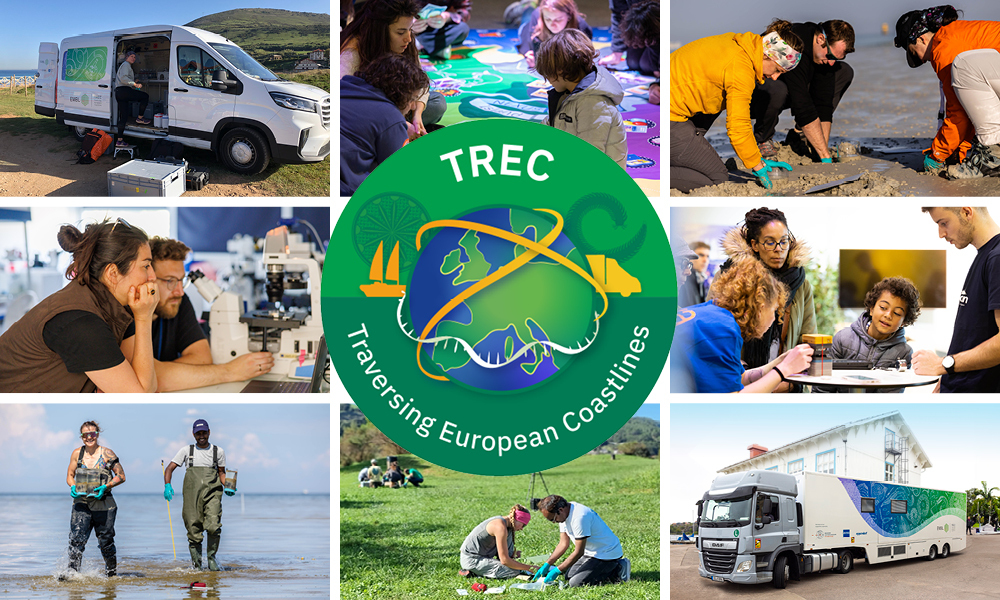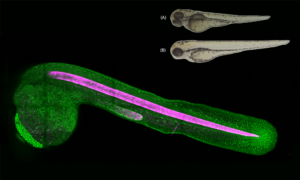
TREC in 2024: bringing it home
The Traversing European Coastlines (TREC) expedition prepares to begin its next phase of sampling with stops in Spain, Greece, Italy and beyond

In many ways, the Traversing European Coastlines (TREC) expedition has been a journey of ‘firsts’.
The first pan-European project of its kind, TREC represents the first time researchers across Europe are collectively and collaboratively examining the biodiversity and molecular adaptability of life at land-sea transects all along the European coastline. Covering over a hundred coastal sampling sites in 21 European countries, the project also makes use of cutting-edge tools being deployed for the first time in the field with the help of innovative solutions like EMBL’s mobile labs.
With this project, EMBL and partners have begun a new era of coastal ecosystems exploration that feeds collaborative, interdisciplinary research to address some of the biggest environmental questions and global challenges, such as climate change, chemical pollution, antibiotic resistance spread, and biodiversity loss.
After a brief winter break, TREC begins its next phase in late February with the extensive sampling, analysis, and public outreach it began in 2023. In this, it will be aided by the spirit of collective innovation and discovery that has characterised the expedition from the first.
“The team is looking forward to interacting with the southern European cultures, reaching out to the general public, and raising awareness about the urgency of the links between planetary and human health and the importance of such a highly collaborative scientific effort,” said Paola Bertucci, Head of EMBL Scientific Expeditions.
Sojourning in Southern Europe
The TREC expedition officially set off from Roscoff, France in April 2023, doing a mix of field sampling and public outreach at various sites in France, Belgium, the Netherlands, Denmark, Germany, Poland, Lithuania, Latvia, Estonia, Finland, Sweden, Norway, UK, Ireland, Spain and Portugal, before a brief winter break.
In February 2024, the next phase of the expedition begins in Spain, where after brief stops in Malaga and Mallorca, it will move on to Barcelona for more extensive sampling. From there, the expedition travels to Banyuls and Villefranche in France. The latter had served as the site for one of the early TREC pilots in 2021, which were instrumental in helping researchers plan the expedition, set up protocols and pilot the mobile services at its current scale.
In April, TREC reaches Italy, with stops at multiple locations, including Naples, which hosted the very first TREC pilot expedition in 2019 and which will also function as a supersite this time. From here, the expedition travels to Split, Croatia, and Kotor, Montenegro, as well as Athens and Thessaloniki in Greece, before returning to Germany.
“In Europe, we are presented with the opportunity to explore a diverse array of coastal ecosystems, which offer us a unique opportunity to study life’s complexity across a spectrum of environments shaped by both natural factors and anthropogenic influences,” said Bertucci. “From temperature gradients to varying levels of salinity, pH, and chemical pollution, each sampling location tells us a story of its ecological status together with the imprint of human activities.”
For the team, the Mediterranean Sea and its coastlines present a contrast to those they explored in 2023. This year, the expedition takes them to regions characterised by a more stratified sea with lower biomass, notably warmer weather, and a very different historical footprint of human activity.
“The standardisation of our sampling strategy, sample processing, and data analysis methods will provide invaluable insights through dataset comparison among all the sampling sites in the Atlantic Ocean, as well as the North, Baltic, and Mediterranean seas, enriching our understanding of these rapidly changing ecosystems,” added Bertucci. “This consistency enables us to draw meaningful comparisons, observing how life responds, adapts, evolves, and influences the environment in different conditions.”
A key feature of TREC is how it combines EMBL’s rich expertise and infrastructure of EMBL with that of its partners, including the Tara Ocean Foundation, the Tara OceanS Consortium, and the European Marine Biology Resource Centre. In the coming months, as the expedition proceeds simultaneously on land and at sea, it will continue to strengthen these collaborations and rely on the scientific strengths of its partners at each of the sampling sites.
Enabling cutting-edge field research
TREC has also served as a springboard for EMBL’s new mobile services, a key undertaking proposed in its 2022-26 programme ‘Molecules to Ecosystems’. The mobile labs, with their high-end equipment and technologies for sample processing, storage, and analysis, will help bring EMBL’s long-standing expertise and leadership in life science service provision within reach of researchers all across its 29 member states.
During the first phase of the expedition in 2023, the mobile labs team helped outfit vehicles for different terrains to support on-site sample collection, processing, and storage. And the EMBL Advanced Mobile Laboratory (AML) – a custom-designed truck with scientific equipment rarely before accessible in the field – helped researchers process biological samples immediately after collection using a variety of advanced methodologies.
Since its first deployment in Kristineberg, Sweden, the AML has travelled to TREC supersites across Europe, where it has not only supported the sampling efforts, but also enabled diverse scientific research activities at partner institutions. In 2024, the AML will visit Barcelona, Rome, Naples, and Athens, while its companion vehicles will accompany the expedition on all of the planned stops. In parallel, the schooner Tara, with its onboard labs, will sample the associated marine ecosystems, allowing simultaneous and comprehensive sampling across land and sea.
Bridging science and society
In addition to answering pressing scientific questions and spearheading technological advancement in field research, TREC will continue to raise awareness of the role of science in society and inspire the next generation of scientists in its member states through public engagement. EMBL’s office of Science Education and Publication Engagement (SEPE), as well as TREC partner organisations like the Tara Ocean Foundation, engage the public at TREC sites with activities, talks, and discussions about the importance of scientific thinking and understanding life at all scales.
One highlight of SEPE’s activities is Nexus Island, a game-based workshop that encourages participants to step into the shoes of a TREC scientist and solve problems with a rational, scientific approach. In 2023, the SEPE team travelled to multiple TREC sites to lead public outreach activities and will rejoin the researchers again, most notably at the supersites in Barcelona, Naples, and Athens.
On the road and beyond
At each location, researchers have collected and sent back numerous samples from both land and sea alongside meticulously recorded metadata. Starting in the second half of 2024, extensive analysis will begin on these samples at EMBL and partnering institutions across Europe, to create an extensive knowledge base that will help solve problems in the present and the future.
As the next phase of TREC begins, the expedition team hopes to use lessons from the previous year in streamlining and strengthening the processes that have contributed to the expedition’s success so far.
“We are excited about the next sampling phase of TREC, yet we are also preparing the steps beyond,” said Peer Bork, Director of EMBL Heidelberg and TREC Scientific Director. “As ambitious as TREC is already with more than 10 years of data analysis ahead, we are engaging in discussions with potential collaborators from many disciplines across the world to initiate synergistic expeditions, also in other habitats beyond coastlines, with the same sampling and quality standards. Then all the resources and open data can be pooled to address urgent environmental challenges across the planet. So we see TREC as a pilot for traversing all ecosystems at an even larger scale.”


